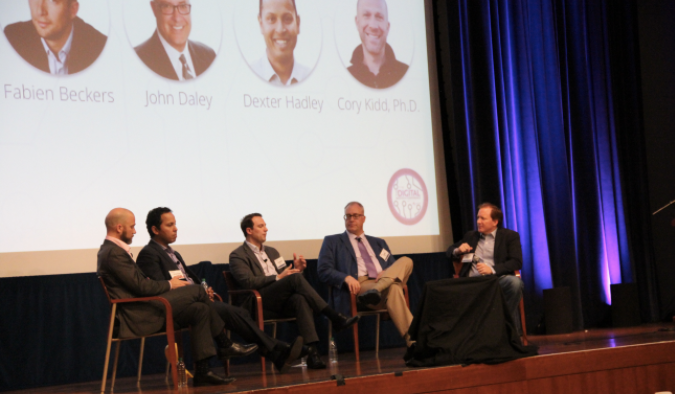
Following the lunch keynote session, we explored how new data streams, sophisticated analytics, and cutting-edge cognitive computing are enhancing and assisting decision-making in today’s digital health landscape during The Future of Health is Cognitive panel session.
This panel session featured:
- Walt Gall, Ph.D., Global Director, Digital Health & Life Sciences, Saffron AI, Intel New Technology Group (Moderator)
- Fabien Beckers, Co-founder and CEO, Arterys
- John Daley, VP, Quality and Regulatory Affairs, IBM Watson Health
- Dexter Hadley, MD, Ph.D., Assistant Professor of Pediatrics, Pathology and Laboratory Medicine, Institute for Computational Health Sciences, University of California, San Francisco
- Cory Kidd, Ph.D., Founder and CEO, Catalia Health
At the beginning of this session, each panelist took some time to explain to attendees who they are, what their company does, and how they plan for cognitive tools to elevate their business strategies and goals. What was most interesting during these presentations was the recurring theme of the need to move full steam ahead with leveraging cognitive learning, and the uncertainty of regulation surrounding the predictions made. The panelists agreed that if you want to be predictive, right now it’s nearly impossible to regulate.
Panelists explored what exactly cognitive health is and the benefits of it to organizations. According to the panelists, cognitive health is reading, reasoning, and learning technology that can understand unstructured safety information. With cognitive health, organizations can add speed, scale, and consistency to health care.
The panel also explained that cognitive computing involves the application of multiple key technologies to the understanding of unstructured data:
- Machine learning
- Predictive analytics
- Natural language processing
By using these technologies, we can move towards a digital-readiness point of view when we can begin unifying different data perspectives. Leveraging integrated technologies is key to ingesting, normalizing, and analyzing data to have the greatest impact on digital health possible.
Read on to continue The Digital MedTech Conference Recap:
Next: The future of digitized health
Previous: What it takes to succeed as a digital health startup today

